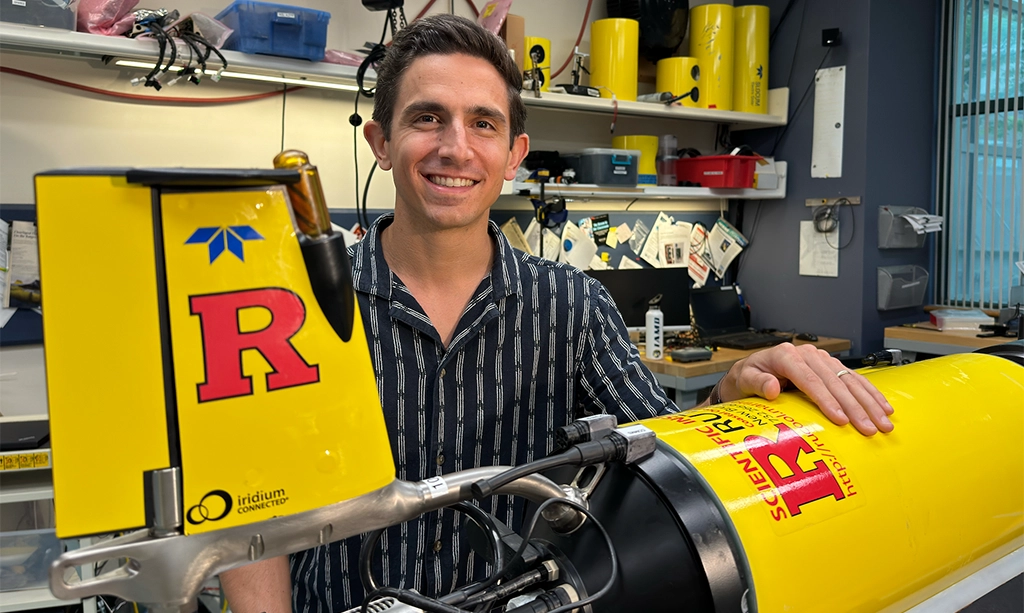Joe Gradone has been recognized for his ability to make science accessible and relevant to diverse audiences
New Jersey native Joe Gradone grew up less than 40 miles from the Atlantic Ocean, but his fascination with oceanography first surged while studying geology as an undergraduate at the University of Colorado.
“It took me going to a land-locked state to realize I want to study the ocean,” said Gradone, who earned his doctorate in oceanography at Rutgers University in September.
A biogeochemical oceanography class led to a summer internship at Rutgers a decade ago, introducing Gradone to underwater gliders. His career path then zig-zagged, from research using gliders to an industry gig testing gliders’ hardware and software and training customers, then back to research. Along the way, his passion and appreciation for amplifying his work’s societal benefits – also known as broader impacts – has grown.
“He has a remarkable ability to make the science accessible and relevant to diverse audiences,” said Janice McDonnell, a broader impacts specialist in the School of Environmental and Biological Sciences at Rutgers.
Gradone recently was awarded the prestigious 2024 Walter Munk Scholar Award and Commemorative Lecture. As part of the honor, Gradone will present a webinar lecture on his research for the international Marine Technology Society on Jan. 23.
The award “is an acknowledgement of not just the important work he’s been doing, but also his future successes, and his commitment to training and mentoring the next generation,” said Rutgers University associate professor and oceanographer Travis Miles, who served as Gradone’s adviser.
In 2020, Gradone joined Rutgers–New Brunswick Center for Ocean Observing Leadership (RUCOOL), which plays an integral role in collecting data in real time to help predict hurricanes and climate change. The temperature of a water mass and percentage of salt it holds determine how much heat and water flows north, affecting climate. A warm ocean is fuel for hurricanes.
Mission: Hurricane Beryl
Over the summer, the 31-year-old piloted a RUCOOL underwater glider in Caribbean waters from his Somerville home toward the eye of Hurricane Beryl – the earliest Category 5 storm on record, reaching winds of 165 mph. The Rutgers glider known as RU29 got within 20 miles of the storm eye wall – a feat never done before – and its sensors captured data used in near real time by the National Hurricane Center to better predict Beryl’s impact as it advanced.
The mission was risky: RU29 had already spent two months collecting data on temperature, currents and levels of salinity and oxygen along a 383-mile swath of ocean between the Dominican Republic and the island of Curacao. The expensive lithium batteries powering RU29 were running low, and if the glider didn’t make it back, valuable data collected by some of the sensors would be lost, Gradone said.
After relaying key information to the National Oceanic and Atmospheric Administration, RU29 made it back to Puerto Rico, where Gradone’s RUCOOL colleagues retrieved it and downloaded a historic dataset. He’ll be using the information for his National Science Foundation (NSF)-funded post-doctoral fellowship at Rutgers.
Amplifying Broader Impacts
Gradone is coprincipal investigator on a three-year, $1.5 million grant to study how waters mix in the Caribbean. Several oceanic circulation systems converge there, and “the combined transport of heat and salt impacts regional and global climate, ecosystems, and, really important to this region, hurricane activity,” he explained.
Gradone used online tools created by Rutgers to define and describe the research proposal’s broader impacts (BI), one of the NSF grant requirements. Rutgers is a partner of the Center for Advancing Research Impact in Society (ARIS) and built the ARIS Broader Impacts Toolkit, a growing collection of online resources that provides researchers with a roadmap to define how their investigation engages communities and advances community benefits. Rutgers recently shared in a $9.1 million grant the NSF awarded ARIS to build capacity in supporting research impact over the next five years.
“The BI toolkit helped us, almost reminded us, that our efforts enhancing ocean science and observing capacity in the Caribbean is a significant aspect of broader impacts,” Gradone said. “Simply put, my hope is that my research benefits society by enabling a better understanding of the ocean’s role in our climate system. This is vitally important to society given our changing climate.”
Since arriving at Rutgers, Gradone has worked closely with McDonnell, a leader in ARIS and the university’s go-to person for broader impacts. His outreach efforts include giving presentations about his research at local libraries and at Rutgers Day, helping Scouts earn STEM-related badges, and guiding local robotics teams.
“Joe is deeply committed to helping people understand hurricanes and improve models and predictions of dangerous storms,” McDonnell said. “His passion for sharing his work’s broader impacts is evident in his important contributions to STEM education, public outreach and, of course, contributions to public policy.”
“A Big Tinkerer”
Gradone was building skateboards out of loose pieces of wood as soon as his parents trusted him with a saw and power tools, he said. “I was always a big tinkerer,” he said.
His latest experimenting is in parenting: Gradone’s wife, Sarah, is due to give birth to their first child, a son, this month. The couple are high school sweethearts, and she is a neonatal intensive care unit nurse at St. Peter’s University Hospital in New Brunswick.
Gradone plans to eventually start his own lab. He encourages aspiring scientists to pursue their path wherever it takes them.
“Science has done so much for me, and I’m always thrilled to maybe help others discover their love of different aspects of science too,” he said. “If I could give one piece of advice to someone in my shoes 10 years ago, I would tell them: just follow whatever seems interesting and you’ll always be excited to go to work,” he said.
Original article on Rutgers Today

